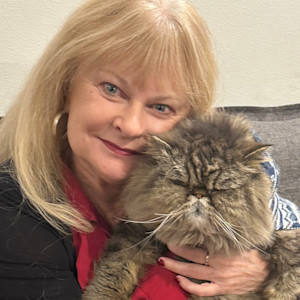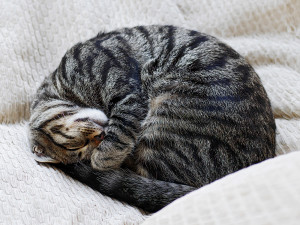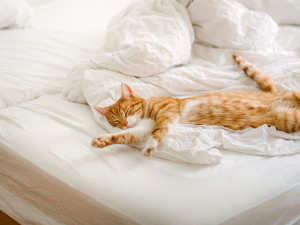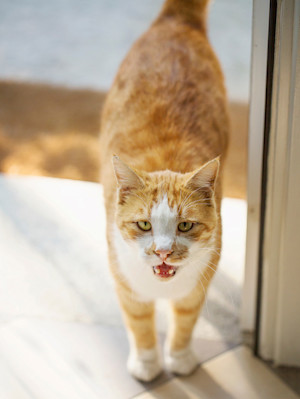Why Does My Cat Snore?
It’s normal, except when it’s loud.

Share Article
In This Article:
Understanding Cat Snoringopens in a new tab What Causes Cat Snoring?opens in a new tab When Snoring Indicates a Health Problemopens in a new tab How to Treat and Manage Cat Snoringopens in a new tab
It’s funny how annoying it can be when you’re trying to sleep and your partner snores, but when your cat snores, you think it’s adorable. Or maybe you’ve never heard a cat snore, and when you finally do, it’s quite shocking.
You may at first think there’s something wrong with your cat. But to answer that question, you need to know the various causes of cat snoring, when it’s normal or not, and when to visit the vet. Lucky for you, we have all the answers you’ll need.

littleKin™ is Kinship’s home just for puppy and kitten parents. Bop over to check out expert advice, new pet tools, and special deals—all curated for your newest family member.
opens in a new tabMain takeaways
Many cats snore and have no health problems.
It is important to understand the difference between normal and abnormal snoring in cats.
There are many causes of cat snoring.
Sometimes, snoring is a sign your cat should see the vet.
Lifestyle and environmental actions can help decrease or eliminate snoring.
Understanding cat snoring
Some cats snore, and others don’t. Meanwhile, some cats don’t snore for years — and then one day, they start. With that in mind, let’s discuss what snoring actually is.
What is snoring?
Snoring is a vibrating soundopens in a new tab that occurs during breathing, if the airflow is partially obstructed as it passes through the throat or nasal passages. It’s a common occurrence in people and animals, including cats. Dogs tend to snore more than cats, but don’t be surprised if your cat snores.
Is it normal for cats to snore?
Snoring in cats is most often normal, especially if it happens occasionally and mainly when your cat is in a deep sleep. If, however, your cat’s snoring is frequent or particularly loud, there may be cause for concern. In particular, if your cat has never snored and suddenly begins to, the new, underlying cause may require a vet visit.
What causes cat snoring?
There are several causes for cat snoring, some mostly normal and others problematic.
Obesity
Considering that more than half of the cat population is overweight, a lot of cats are snorers. If your cat is overweight, excess fat can accumulate around the neck and throat. This will increase the probability of some degree of airway obstruction and thus lead them to snore.
Sleep positions
You’ve undoubtedly seen the many adorable positions cats can get into. Certain positions may involve resting their head or body in a way that compresses their airways. This can cause snoring.
Allergies and respiratory issues
A cat’s airways can swell or even partially block due to allergies, asthma, or respiratory infections. This can lead to snoring sounds. Polyps or tumors in the upper airways can also be the cause.
Breed characteristics
Certain breeds, known as brachycephalics, are more prone to snoring because the bones in their heads are short, an elongated soft palate partially blocks the trachea (or windpipe), or their nasal passages are small. These traits can cause snoring and are commonly seen in Persians and Himalayans.
When snoring could indicate a health problem
If you have been a pet parent to your cat for several months or years, and never heard them snore, and then you suddenly do — that could indicate a problem. If your cat has always snored, but that snoring is suddenly louder, more frequent, or accompanied by other concerning symptoms, this can mean something is wrong.
When to seek veterinary care
Concerning symptoms include such things as:
Labored breathing
Sneezing
Coughing
Nasal discharge
Changes in behavior
Changes in your cat’s voice
Wheezing
If your cat suddenly starts snoring, or their snoring has changed and is accompanied by these symptoms, it’s essential to consult a veterinarian to ensure your kitty doesn’t have a serious condition.
Diagnosing the cause of snoring
Once you bring your kitty to the vet, they will perform a thorough physical exam, get a detailed history from you, review your cat’s prior medical history, and may recommend blood work. In addition, imaging (such as X-rays, CT scans, or MRIs) may be needed.
How to treat and manage cat snoring
Lifestyle changes
Feed your cat a well-balanced, high-quality diet, ensure they get regular exercise, and provide a stress-free environment. These tips can keep your cat healthy, which in turn will help decrease their snoring.
Weight management and diet
If your cat is overweight, that could be contributing to their snoring. The same lifestyle changes mentioned above — a high-quality diet and regular exercise — should help, as will portion control. Weigh your cat regularly, and talk to your vet about possibly trying a weight reduction diet.
Modifying sleep environments
A quiet, stress-free sleeping environment with comfortable bedding, regulated temperature, and air circulation may help minimize snoring.
Medical treatments for underlying issues
Medication may be needed for conditions such as respiratory infections or allergies. Surgery will be recommended if the problem is a polyp, mass, or other structural abnormality.
FAQs
Why does my cat’s breathing sound like snoring?
Your cat’s breathing may sound like snoring, because it may actually be snoring. Sleeping positions or respiratory issues can cause vibrations in their nasal passages or throat. Polyps or, in flat-faced cats, elongated soft palates can lead to obstructions, too. Snoring is a word we are accustomed to using for a person or animal who’s asleep, but the very same causes and sounds can occur while they’re awake.
Do overweight cats snore?
Many overweight cats snore because they have increased fat around their throats, which compresses and restricts airflow. If this happens, it is important to help your cat lose weight — not just to get rid of the snoring, but for general health reasons. Overweight cats are more prone to diabetes, joint problems, and other health issues.
Is it normal for cats to snore loudly?
No, loud snoring is not usual in cats. The sound of a cat snoring is typically soft and quiet. If your cat’s snoring is suddenly louder, this could indicate a medical issue. Watch for other symptoms and see your vet if the snoring persists or worsens.
References
Bates, Mary. “What Do Animals Dream About? Peek inside the Minds of Sleeping Animals.” Muse, vol. 20, no. 9, Nov. 2016, pp. 20–24, go.gale.com/ps/i.do?id=GALE%7CA472473327&sid=googleScholar&v=2.1&it=r&linkaccess=abs&issn=10900381&p=HRCA&sw=w&userGroupName=anon%7E323dce80&aty=open-web-entryopens in a new tab. Accessed 25 Dec. 2024.
Gleason, Hadley E, et al. “Influence of Feline Brachycephaly on Respiratory, Gastrointestinal, Sleep, and Activity Abnormalities.” Veterinary Surgery, vol. 52, no. 3, 29 Dec. 2022, pp. 435–445, https://doi.org/10.1111/vsu.13931opens in a new tab.
“Respiratory Infections | Cornell University College of Veterinary Medicine.” www.vet.cornell.edu, June 2018, www.vet.cornell.edu/departments-centers-and-institutes/cornell-feline-health-center/health-information/feline-health-topics/respiratory-infectionsopens in a new tab.

Dr. Shelby Neely, DVM
Dr. Shelby Neely is a freelance writer and veterinarian who graduated from The University of Pennsylvania and has practiced veterinary medicine for 30 years. She has found homes for hundreds of stray pets and has two cats as well as four grand-dogs and two grand-cats. In her spare time, Dr. Neely likes to be with her three children, their dogs and cats, and her own two cats. She also likes to see as many Broadway shows as possible.
Related articles
![Red Cat On Threshold Looks At The Camera And Meows.]() opens in a new tab
opens in a new tabWhy Is My Cat Breathing Heavy?
This can happen over time or very suddenly. Either way, it’s important to learn more about this symptom.
![Man in his mid 20's cuddling in bed with his white labrador puppy.]() opens in a new tab
opens in a new tabWhy Napping With Your Pet Is Actually Good for You
This study says you benefit from a power nap. Guess what? So does your cat or dog.
![White cat switching on lamp on couch]() opens in a new tab
opens in a new tabWhy Does Your Cat Wake You Up at Night?
You want to sleep, your cat wants to party. Here’s how to deal.
![dark-haired woman hugging cat that has imprinted on her]() opens in a new tab
opens in a new tab10 Signs Your Cat Has Imprinted on You
Feeling like you have a little shadow these days? Here’s why that’s happening.
![a red cat stretching on a bed]() opens in a new tab
opens in a new tabWhy Is My Cat Twitching in Their Sleep?
Sure, it’s curious—but is it also concerning?





